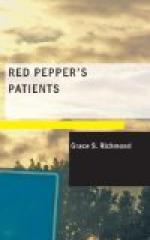It was a little house to which Burns conducted his friend and latest patient; it was a low-ceiled, homely room, warm with lamplight and comfortable with the accumulations of a lifetime carefully preserved. In the worn, old, red-cushioned armchair by a glowing stove sat an aged figure of a certain dignity and attractiveness in spite of the lines and hues plainly showing serious illness. The man was a man of education and experience, as was evident from his first words in response to Burns’s greeting.
“It was kind of you to come again to-night, Doctor. I suspect you know how it shortens the nights to have this visit from you in the evening.”
“Of course I know,” Burns responded, his hand resting gently on the frail shoulder, his voice as tender as that of a son’s to a father whom he knows he is not long to see.
There was a woman in the room, an old woman with a pathetic face and eyes like a mourning dog’s as they rested on her husband. But her voice was cheerful and full of quiet courage as she answered Burns’s questions. The pair received Gardner Coolidge as simply as if they were accustomed to meet strangers every day, spoke with him a little, and showed him the courtesy of genuine interest when he tried to entertain them with a brief account of an incident which had happened on his train that day. Altogether, there was nothing about the visit which he could have characterized as painful from the point of view of the layman who accompanies the physician to a room where it is clear that the great transition is soon to take place. And yet there was everything about it to make it painful—acutely painful—to any man whose discernment was naturally as keen as Coolidge’s.
That the parting so near at hand was to be one between lovers of long standing could be read in every word and glance the two gave each other. That they were making the most of these last days was equally apparent, though not a word was said to suggest it. And that the man who was conducting them through the fast-diminishing time was dear to them as a son could have been read by the very blind.
“It’s so good of you—so good of you, Doctor,” they said again as Burns rose to go, and when he responded: “It’s good to myself I am, my dears, when I come to look at you,” the smiles they gave him and each other were very eloquent.
Outside there was silence between the two men for a little as they walked briskly along, then Coolidge said reluctantly: “Of course I should have a heart of stone if I were not touched by that scene—as you knew I would be.”
“Yes, I knew,” said Burns simply; and Coolidge saw him lift his hand and dash away a tear. “It gets me, twice a day regularly, just as if I hadn’t seen it before. And when I go back and look at the woman I love I say to myself that I’ll never let anything but the last enemy come between us if I have to crawl on my knees before her.”
Suddenly Coolidge’s throat contracted. His resentment against his friend was gone. Surely it was a wise physician who had given him that heartbreaking little scene to remember when he should be tempted to harden his heart against the woman he had chosen.




